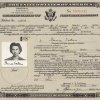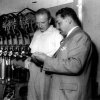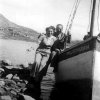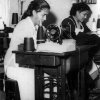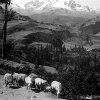Refuges
“[…] the loss of our country in which both our ancestors and our ancestors have always lived through the centuries and which was our homeland was very difficult to bear.“ (Eva Ullmann, nee Grünwald)
St. Pöltner Jews fled to Czechoslovakia, to Belgium, France, Great Britain, Switzerland, Hungary, the Netherlands, South America and Australia, the Belgian Congo and Shanghai, and of course to Palestine and the USA.
Emigration to European countries depended on the receipt of a visa that was rare and only granted under certain conditions. Switzerland and Czechoslovakia made their borders very fast. Traditional immigration countries such as Australia, Canada and the South American countries were still suffering from the global economic crisis and refused to accept penniless Jews.
USA
Irma Salus, the daughter of the leather goods merchant Richard Lustig, received the life-saving papers as early as June 1938 and became an American citizen in 1943. Her sister Rosa Kubin also left Austria in the summer of 1938. After a long-term job, she was given a post as a chemist at the prestigious Middlesex University (today Brandeis) at the Faculty of Veterinary Medicine.
Bolivia
Ernst Medak from Vienna drove in September 1938 on the pretext of a business trip to Paris. In his pass was the note "for the German Reich" and he was not yet marked with the "J". His wife, Rosa, from the Viehofen family Frank, followed him. Together they traveled across France and Spain to La Paz in Bolivia, where there was already a Jewish branch. The immigration was difficult: among the emigrants a typhoid epidemic broke out, because many were weakened by the unfamiliar climate and food. "The Europeans do not hold the height," said the treating Bolivian doctor.
Ernst Medak had already produced corsetry in Vienna and established a knitwear production with a colleague in Cochabamba. He learned fifteen indigenous women and made sweaters, waistcoats and baby clothes. Rosa Medak spoke a "Spani-Spanische like the Kuchlböhmisch of the Viennese servants", her husband could communicate very well.
After the successful start of the business, Rosa Medak set up a bookstore and lending library with a girlfriend who led antiquarian books and new releases. In 1948 Ernst and Rosa tried a new beginning in Vienna, but it was impossible "to get even a sewing machine". It was only in 1957 that the couple finally returned to Vienna.
Shanghai
As an open city, Shanghai afforded refuge to every immigrant. This meant the last salvation for thousands of Jews before the destruction. In December 1941, after the entry of Japan into the war, the situation of the refugees worsened. The Japanese, who collaborated with the Germans, concentrated the Jews in enclosed districts. Nevertheless, survival, even under the most difficult circumstances, was possible. From St. Pölten via Trieste to Shanghai the families Grünwald and Willner fled among other things.
„I then went with the mummy four weeks later than the dad. I was a glowing patriot, I am still today, not a nationalist, but a patriot. So I only cried, howled, cried, and the conductor always came back and consoled me. And not long before the frontier has he come and said: »Jetzt hams es bald überstanden« (soon it's going to be over).“ (Olga Willner)
Dr. Willner had already been baptized before the war and was therefore able to work as a doctor in the missionary hospital Yenchow. He fell ill with an accident and was not able to recover. In the resulting material hardship Olga Willner had to get her parents as well as her studies.
„My parents have never immersed themselves in China [...] I immediately and marvelously immersed myself. I have lived there with enthusiasm. And I must say one thing, I would never have gone from China if the Mao Tse Tung had not come.“

